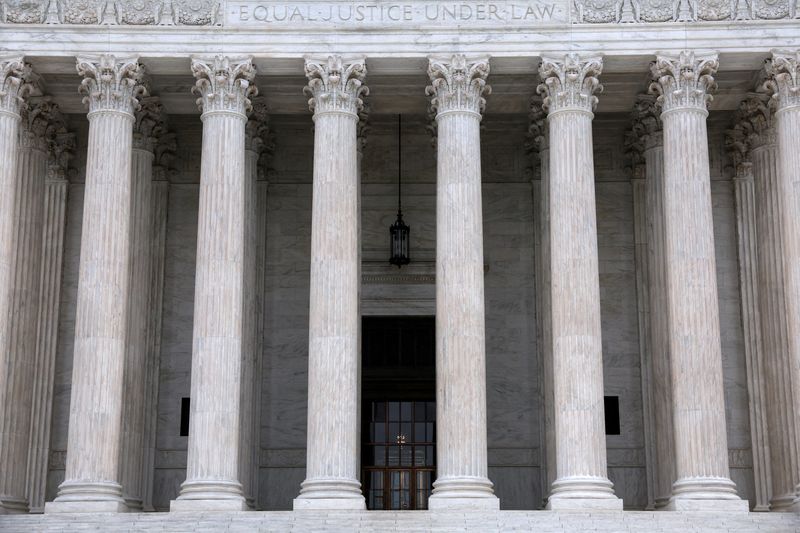By John Kruzel
WASHINGTON (Reuters) - Three cases before the U.S. Supreme Court will help determine the advance of the conservative push called the "war on the administrative state" that aims to weaken federal agencies that regulate key aspects of American life and business.
The court, with a 6-3 conservative majority, is weighing cases challenging the power of federal agencies to issue regulations and enforce laws in areas ranging from finance to fish conservation, that could have far-reaching reverberations.
Administrative agencies have suffered major blows to their authority in recent years when challengers, often aligned with conservative and corporate interest groups, have faced off against Democratic President Joe Biden's administration.
Belying its conservative lean, the court sided with the Biden administration's COVID-19 vaccine requirement for healthcare facilities while blocking vaccination-or-testing mandate for large businesses. It is not clear how the justices will rule in the pending disputes - or whether they will go as far as challengers would like in decisions expected by June.
Here is an explanation of these cases and their possible consequences:
IS 'CHEVRON DEFERENCE' DOOMED?
As it approaches its 40th birthday, a legal doctrine known as " Chevron deference" faces a murky future.
The court heard arguments on Thursday in two cases involving commercial fishermen seeking to sidestep fees for a government-run herring conservation program. The cases have exploded into a key battle in the broader war on the administrative state.
The fishermen, supported by billionaire Charles Koch's network and other conservative groups, urged the justices to overturn or at least rein in the legal doctrine that stems from a 1984 precedent involving oil giant Chevron Corp (NYSE:CVX) and calls for judges to defer to federal agency interpretation of U.S. laws deemed to be ambiguous.
Some legal scholars have said that were the court to limit or eliminate Chevron deference, it would likely harm Democratic presidential administrations more than Republican ones, as Democrats are typically more interested in regulating industry.
The Biden administration urged the justices to preserve the doctrine, arguing it recognizes the need for agencies to "fill in the gaps" when legislation is ambiguous.
The questions posed by the justices did not reveal a clear majority willing to overturn the precedent but suggested the court could sharply limit its application. Some conservative justices seemed skeptical of the doctrine, while the court's liberal justices appeared ready to preserve the doctrine's deference to the expertise of agencies.
The doctrine's defenders say overturning it could curtail the power of potentially every federal agency, and risks hampering efforts to regulate everything from the fossil fuel industry to housing discrimination to publicly funded health insurance programs such as Medicare and Medicaid.
WILL THE CONSUMER FINANCIAL PROTECTION BUREAU SURVIVE?
Many conservatives believe the U.S. Consumer Financial Protection Bureau, or CFPB, wields too much power and burdens banks and other lenders with unnecessary red tape. These critics are hoping a pending case will bring the watchdog agency's operations to a halt.
The justices on Oct. 3 heard arguments in a challenge by payday lenders to the CFPB's funding structure in a case that the Biden administration warned could imperil the agency that has delivered $19 billion of relief to U.S. consumers.
The agency, set up after the 2008 global financial crisis to curb predatory lending, draws money each year from the U.S. Federal Reserve rather than being directly funded by Congress. Its challengers say the funding mechanism violates a constitutional provision giving lawmakers the power of the purse.
At least two of the court's six conservative justices signaled doubt over the challenger's argument. The court's three liberal justices also appeared skeptical of the idea that the CFPB's funding design violates the U.S. Constitution's "appropriations clause," which vests spending authority in Congress.
CFPB supporters have said that invalidating its funding mechanism could endanger similarly structured agencies including the Federal Deposit Insurance Corporation, Office of the Comptroller of the Currency and the Federal Reserve Board.
WHAT'S THE FATE OF IN-HOUSE JUDGES AT THE SEC?
A third case involves the legality of in-house tribunals at the Securities and Exchange Commission.
The court heard an appeal by the Biden administration on Nov. 29 after a lower court deemed unconstitutional the SEC's proceedings before the agency's administrative judges. These in-house adjudications can lead to financial penalties.
The case arose after the SEC fined Texas-based hedge fund manager George Jarkesy and barred him from the industry after determining he had committed securities fraud. Jarkesy then challenged the legality of the agency's system, scoring a win at the New Orleans-based 5th U.S. Circuit Court of Appeals.

During arguments, the conservative justices focused on a part of the 5th Circuit's ruling that found that in-house proceedings violated the U.S. Constitution's Seventh Amendment right to a jury trial. Some conservative justices expressed concern that SEC administrative proceedings are conducted for certain charges, such as fraud, without a jury, when similar cases alleging fraud in federal court would have one.
A ruling against the SEC could reduce or delay action against misconduct by brokers, investment advisers and others, and potentially frustrate enforcement at other federal agencies as well. The Biden administration warned the justices of "wide repercussions" from such a decision, noting that two dozen agencies impose penalties in administrative proceedings.